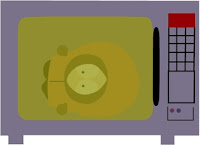We’re fostering a couple kittens right now that we rescued from the alley alongside our building. They were Mathilda and Charlie Baltimore for a while, then they hit puberty, certain things developed, and we realized Greystoke and Tarzan might be better names. Then it was Gandalf and Sauroman. We’ve finally settled on Loud Howard and Charlie Gibson.
Bonus points if you know where all those names come from.
The downside is, we ended up with fleas in our apartment. Every time I thought we wiped them out a new wave surged up. I got bit at least once a day. They’re just tiny, annoying things. No one likes a flea.
No, not even the people who run flea circuses. Those things are all fake, anyway.
 Do any of you even know what a flea circus is or am I just dating myself again?
Do any of you even know what a flea circus is or am I just dating myself again?
Hey, look! The Flea!
Anyway, the thing is, my beloved is reading for a contest right now, and the flea problem made her come up with an analogy. She’d just finished her latest pile, which included (among others) a big cosmic-level story about universe-threatening monsters or something like that and also a more “indy” story about a character who sat and really did nothing while interesting things happened all around her. As my lady love put it, they were stories that focused on the flea on the back of the dog who was chasing the car that the bank robbers were escaping in from their heist.
Let me put it simpler terms. Who’s writing a story set in the modern-day, 2010 United States?
Okay, now how many of you are writing about the health care crisis? The bill passed but there are still arguments and debates and questions and the earliest bits of it won’t begin until next year. It’s a huge issue that affect everyone in this country on one level or another.
Which means it’s affecting your characters. So, who put it in their story? Anyone?
Anyone?
Bueller?
I’m going to go out on a limb and guess not many of you. I’ll step a bit further out and presume you didn’t include it because it wasn’t really relevant to the story you were trying to tell. Which is also why you probably didn’t include a lot about either the war on terror or climate change.
Does the flea have an effect on the bank robbers? Do the bank robbers have an effect on the flea? No, don’t talk to me about the butterfly effect or interconnectedness or any of that nonsense. They’re yes or no question, and if you’re going to be a halfway decent writer you have to be honest about answering them
The point I’m trying to make is that you have to know which story you’re telling. Am I telling the story of the flea, or the story of the bank robbers? Because there does come a point, by sheer sense of scale, that they’re not the same story anymore. In the same way health care or global warming are just too big to have them “casually” in my writing, odds are this phenomenal bank heist is way beyond the life of the flea.
In my experience, this issue comes up a lot in little “art” stories. Writers try to bring in big, complex issues to make their story more “real” and give it “scope” (d’you notice how many of these things I have to keep putting in quotes?). Alas, since the story is really about some introspective naval-gazing these issues are more a distraction that anything else. All they’re doing is wasting words that could be used for better things. This is the story of the flea where someone tries to keep talking about the bank robbery.
This is also why a lot of epic stories tend to fail, just coming at it from the other side. When a writer is focused on creating the most cosmic-level story they can, they generally don’t give the reader anyone to relate to, just people to be in awe of. A story needs a character to be our entry point, and world-changing, epic stories that overwhelm said character are just too big. It’s the story of the bank heist and the audience has all become fleas. One film critic (whose name, I hate to admit, escapes me at the moment) made the clever observation a while back that stories like Star Wars and Lord of the Rings succeeded despite their epic stories, not because of them.
I was going to put some examples of this sort of thing, but the more I thought about it (and kept going over this little rant) the more I realized how hard that would be. This is really just one of those things you get or you don’t. If you’re reading this and think I’ve kind of wasted this week’s rant on the obvious, you probably get it. If you have no idea what I’m talking about, or you’re already composing an angry retort, odds are you don’t. It’s just one of those things that makes sense after processing a given amount of storytelling. I wish I could be clearer about it, but the best I can do is point you in the right direction and give you a rough idea of what you’re feeling around for. One day it’ll all just click. It did for me.
If a story’s going to be small and intimate, then keep it small and intimate. If it’s going to be big, remember to give all us regular folks a gateway into that big story or we’ll just get lost in it. Odds are a manuscript can’t handle being stretched between the two extremes, so writers need to be clear what their story is about.
Next time, I’m going to make things as easy as possible to get through.
Until then, go write.



